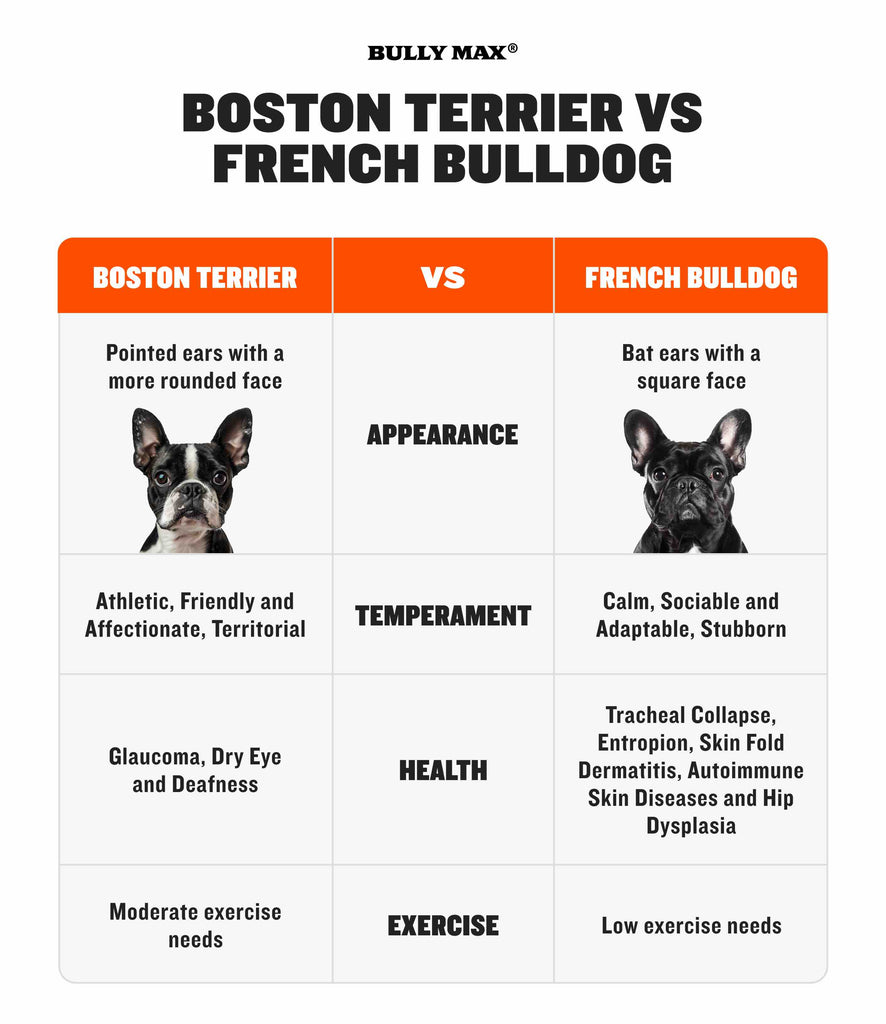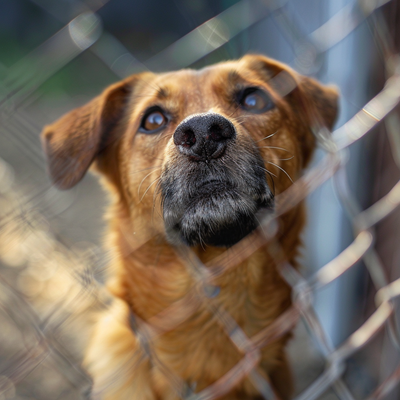Boston Terrier vs French Bulldog: What are the differences?
Boston Terriers and French Bulldogs are popular family pets because they are friendly, affectionate and charming. They may be difficult to distinguish from each other at first glance but they have some notable differences. They quite differ in some aspects such as energy levels, health issues and temperament.
Are you trying to decide between a Boston Terrier and a French Bulldog? Read this article to find out more about these breeds.
Appearance, Color and Size
Boston Terriers and French Bulldogs may be hard to distinguish from one another due to some of their similar physical characteristics. Both breeds are classified as small to medium dog breeds. They also belong to the brachycephalic breed group due to their flat faces.
Boston Terrier
The Boston Terrier has a round face, pointy ears, and a slender athletic body. Their coat colors include brindle, seal or black in color and evenly marked with white. A white muzzle band and a white blaze between the eyes and over the head is also a characteristic appearance of the breed. They weigh lighter than French bulldogs at an average of 19 pounds. According to AKC standards, they are also slightly shorter, being 10-12 inches tall. However, they have longer legs than the Frenchie - a reason why some may be taller.
French Bulldog
The French Bulldog has a square face, bat ears, and a short stocky body. They have a wider variety of coat colors compared to Boston Terriers. The most common ones are white, brindle, fawn, sable and tan. French Bulldogs with black and white markings are easily confused with Boston Terriers. They weigh an average of 22 pounds, a little bit heavier than Boston Terriers. They are also slightly taller than Boston Terriers, being 11-13 inches tall.
Personality and Temperament
Both the French Bulldog and the Boston Terrier are affectionate and great family pets. They settle well in apartments, do not require much exercise and only bark seldomly. They even have equal mental stimulation needs. However, they still differ in some aspects.
The Boston Terrier is a little more energetic than the French Bulldog. This breed is also more likely to bark than the Frenchie. In terms of adaptability, the French Bulldog offsets the Boston Terrier. This breed also tends to be more territorial. It is important to socialize your Boston Terriers early in life.
Although more quiet, the French Bulldog is more notorious. This is the reason why this breed may be harder to train than Boston Terriers. They can also become stubborn at times. If poorly trained, they may become aggressive towards other dogs.
Facial Features: French Bulldog vs Boston Terrier
French Bulldogs and Boston Terriers are easy to confuse due to their short snouts, minimal tails and bug-eyes. There are some distinct facial features that differentiate the two breeds.
The French Bulldog is known for its bat-like ears that are moderate in size and stand erect on their square-shaped head. The Boston Terrier has pointed ears and their heads are more round.
The Boston Terrier has a wide nose that is black and well defined with a line between its nostrils. While the French bulldog also has a line between its nostrils, its nose is extremely short with broader nostrils.
Health Issues
The average life expectancy of the French Bulldog is 10-12 years while the Boston Terrier is at 11-13 years. In general, Frenchies have more health problems than the Boston Terrier.
Breathing Disorders
Both breeds are brachycephalic breeds meaning they have flat faces and are at risk for having breathing problems. It is also important to note that they are both prone to heat stroke due to this. They are both likely to have stenotic nares or narrowed nostrils. This disease results in difficulty in breathing due to the narrowed air passage. Surgery is the only treatment available. In some cases, stenotic nares may also indicate a more serious disorder - the Brachycephalic Obstructive Airway Syndrome (BOAS). It refers to a particular set of upper airway abnormalities including stenotic nares, elongated soft palate and hypoplastic trachea, all of which compromise respiration. Treatment of BOAS includes medical and/or surgical management depending on the severity.
Tracheal Collapse
Tracheal collapse is a breathing disorder more frequently encountered with French Bulldogs. It happens when the cartilage rings along the tracheal wall lose their strength and rigidity which makes it difficult for air to get to the lungs. Treatment of this disorder includes medications, surgery or both depending on the severity of the case.
Skin Issues
Between these two breeds, French bulldogs will face more skin issues in their lifetime. While both of them might have equal likelihood of having allergies, French bulldogs are at more risk of having skin fold dermatitis and autoimmune skin disorders.
Skin Fold Dermatitis
Skin fold dermatitis is an infection formed in a pocket between two folds of skin causing itching, pain and malodorous smell. It is treated with oral and topical medications.
Autoimmune Skin Disorders
On the other hand, autoimmune skin disorders are more serious conditions of French Bulldogs. This happens when the immune system attacks the dog’s otherwise healthy skin tissues. Treatment includes suppression of the immune system and correction of secondary infections.
Eye Disorders
They are also both prone to several eye conditions such as cherry eye and cataracts. Cherry eye is characterized by the prolapse of the third eyelid in dogs which causes eye irritation. Surgery is indicated in this condition. On the other hand, cataracts manifest as clouding in the lens of the eye, impairing vision. Depending on the case, ophthalmic drops and surgery may be opted as treatment. Of the two, Boston Terriers are more prone to having glaucoma and dry eye.
Glaucoma
Glaucoma happens when there is increased pressure in the eye and can manifest as eye pain and vision loss. Depending on the case, ophthalmic drops and surgery may be treatments to be used by the veterinary ophthalmologist.
Dry Eye
Dry eye occurs when the eye cannot produce adequate tears and lubrication causing eye irritation and ulcers. Treatment includes long term application of lubricating and tear-stimulation eye drops.
Entropion
However, French Bulldogs are more likely to have entropion or the inward rolling of the eyelids. This causes constant irritation to the eye surface. Surgery is the treatment of choice in this case.
Musculoskeletal Disorders
Both breeds are prone to patellar luxation which means the kneecaps dislocate. Additionally, they may also have intervertebral disc disease where the spinal vertebrae compress causing mobility issues. In mild forms of the disease, both of these conditions of these breeds can be medically managed. Surgery is indicated in the more severe forms of the disease.
Hip Dysplasia
French Bulldogs are more likely to develop hip dysplasia. This occurs when the hip bone and its cartilage start to degenerate. Surgery is indicated in most of the cases of hip dysplasia as it causes pain and difficulty walking.
Ear Disorders
Both the Boston Terrier and French Bulldogs are prone to ear infections. The anatomy of their ears are susceptible to accumulating debris and wax, which can lead to infections. Signs of ear infections include itchy and reddish ears, ear discharges, head shaking and ear pain. The veterinarian will diagnose the specific type of infection by doing an ear cytology. Treatment in mild cases include otic drops and medicated shampoos.
Deafness
Boston Terriers have an increased likelihood of having or developing deafness. Due to a genetic abnormality, up to 5% of Boston Terriers may be deaf. Most cases of deafness in Boston Terriers can not be treated but are well-tolerated. A veterinarian will conduct Brainstem Auditory Evoked Response (BAER) testing to determine if your dog is deaf.
Price Comparison
The cost of a Boston Terrier or a French Bulldog can vary depending on your location. Other factors that influence cost are age of the dog, breeder reputation and certain features (e.g. rare coat color). On average, Boston Terriers can cost between $1,000 and $3,000. French Bulldogs can cost between $2,000 and $4,000. In general, French Bulldogs are slightly more expensive than Boston Terriers.
Breed History and Size Comparison
Boston Terrier
The Boston Terrier resulted from crossing terriers and bull-type breeds to produce dogs who could excel at pit fighting and ratting contests. The common ancestor of the Boston Terrier was known as “Judge”. Originally from Liverpool, Judge was a cross between a Bulldog and the now-extinct white English Terrier. Sometime in the 1870, Judge was sold to a Bostonian owner. He was then bred in Boston and the Boston Terrier became a recognized breed by the AKC.
French Bulldog
The French Bulldog was developed in France. The breed originated from England and first appeared in the city of Paris as a result of cross-breeding of English toy bulldogs and local terrier breeds. Although its progenitors are bred for bull-baiting and pit-fighting, the French Bulldog was bred to be a companion dog. It was famous among lace makers in the French countryside and was known as Bouledogue Français. By the end of the 19th century, the French Bulldog became popular across Europe and America.
Size Comparison
Historically, the French Bulldog’s size does not differ much from the present. Their average weight is similar to one of their progenitors, the English toy bulldogs. The first French bulldogs by then weighed at around 15-24 pounds. Nowadays, French Bulldogs weigh 16-28 pounds.
Ancient Boston Terriers are heavier than the modern Boston Terriers. For instance, the common ancestor of the Boston Terrier, “Judge”, weighed a whopping 32 pounds. In the present, Boston Terriers are smaller at 12-25 pounds.
Family Compatibility and Friendliness Towards Strangers
Both the Boston Terrier and French Bulldog are great family pets. They are affectionate to the family, even to young children. Despite this, any dog should always be supervised around young children, or children of any age who have little exposure to dogs.
Both the Boston Terrier and the French Bulldog are generally friendly toward strangers. When compared, French Bulldogs are likely to be more reserved or cautious around new people. Either way, socialization is important for both breeds.
Puppy Prices
Puppy prices of both breeds depend on several factors. Here is a list of some.
Reputability of the breeder
Responsible breeders make sure that your puppy will be healthy and from a pureline by taking several measures. For instance, they provide optimal care and maintain sanitary living conditions. Some even screen their breeding stocks for genetic diseases. These practices add to the total cost of the puppy. This is also a good reason why finding a reputable breeder is important.
Cost of Breeding
Both the Boston Terrier and French Bulldogs are challenging to breed due to their body conformations. In most cases, natural breeding and birthing is not a viable option. Artificial insemination is a safer alternative for these breeds. Moreover, more than 90% of pregnancies in both breeds result in C-Sections. This is a reason why their puppies may become expensive.
Rarity
French Bulldogs and Boston Terriers have rare coat colors. For French Bulldogs, rare coat colors are black, blue, chocolate, lilac and merle. Chocolate brown, red, and blue are the rare coat colors of Boston Terriers. The rarer the coat color, the higher the cost for the puppies of these breeds.
Boston Terriers cost between $1,000 and $3,000. On the other hand, French Bulldogs cost between $2,000 and $4,000. This slight price difference may be attributed to the recent popularity of French Bulldogs. The high demand for this breed resulted in an increase in cost of puppies.
Activity Level and Exercise Needs
The difference in activity level and exercise needs of French Bulldogs and Boston Terriers may be influenced by why they are bred. For instance, Boston Terriers are originally bred for pit fighting and vermin killing. On the other hand, Frenchies are bred as companion dogs of lacemakers. This is the reason why Boston Terriers are more athletic in nature.
Boston Terriers have higher energy levels than the French Bulldog. They require around one hour of exercise every day. This breed will enjoy long walks and runs as part of their routine. If under-exercised, they tend to have destructive behavior.
French Bulldogs are also recommended to have an hour of physical activity everyday. However, they can still tolerate shorter periods without getting bored or destructive unlike the Boston Terrier. Frenchies will enjoy short low-intensity walks with breaks. They also do well with indoor exercise.
Key Differences and Considerations
To summarize, here is a table differentiating Boston Terriers and French Bulldogs.

French Bulldogs have more health issues than Boston Terriers. This means that owning French Bulldogs will require more veterinary visits than the average. However, some people will prefer this breed over the Boston Terrier due to their calmer nature and lower exercise needs. They are also compatible with small children. Socializing both of these breeds early in life makes them the ultimate family-oriented pet.
Conclusion
Boston Terriers and French Bulldogs are both friendly and affectionate dogs. Considerations in choosing come down to health issues, exercise needs and temperament. Boston Terriers have lesser health issues but they have higher energy levels. French Bulldogs are more calm and have lower energy levels.
In the end, the ultimate choice comes down to the preference and lifestyle of the future owner. Nonetheless, both breeds are great family pets and are suitable for first time dog owners.
Do you have a Frenchie or a Boston? Share your experience by leaving us a comment below.






![How to Train a Search and Rescue Dog [Dog Trainer Explains]](http://shop.bullymax.com/cdn/shop/articles/Search_and_Rescue_Dogs_in_dog_training_court.jpg?v=1713867590&width=400)

